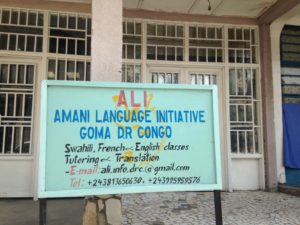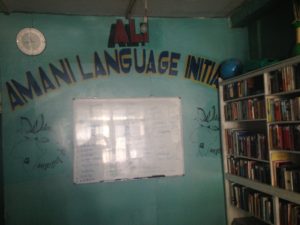
Before I came to Congo, I thought that my French language skills would come in handy and I would be able to communicate easily with people since French is the official language of the country. However, a harsh reality hit me when I realized Gomatriciens or those living in Goma prefer to speak Swahili. Only 46% of the population can read and write in French (OIF 2014). At church, at the market, at the workplace, and in everyday life, Swahili is spoken more commonly and frequently. French is usually reserved for official meetings. Stewart, my Kiswahili instructor explained that if you cut the country down the middle, the East speaks predominately Swahili and the West speaks Lingala.
 My first day in Swahili class at the Amani Language Initiative, Stewart and I had a good laugh. Well, mostly Stewart. As the founder of both the Amani Language Initiative, a training center that teaches Swahili, French, and English classes as well as the head of a non-governmental organization, Stewart had just won a Young African Leaders fellowship. As he told me about his award and travel plans, I congratulated him in Swahili by saying, “Hongera!” All of a sudden, Stewart burst out in uncontrollable laughter. I couldn’t understand what was so funny. After a few minutes, Stewart explained that hongera is a very formal Swahili term and he didn’t expect me to use it let alone know it. This was my first lesson in Swahili—the Kiswahili I had begun to learn the prior semester was completely different from Congolese Swahili.
My first day in Swahili class at the Amani Language Initiative, Stewart and I had a good laugh. Well, mostly Stewart. As the founder of both the Amani Language Initiative, a training center that teaches Swahili, French, and English classes as well as the head of a non-governmental organization, Stewart had just won a Young African Leaders fellowship. As he told me about his award and travel plans, I congratulated him in Swahili by saying, “Hongera!” All of a sudden, Stewart burst out in uncontrollable laughter. I couldn’t understand what was so funny. After a few minutes, Stewart explained that hongera is a very formal Swahili term and he didn’t expect me to use it let alone know it. This was my first lesson in Swahili—the Kiswahili I had begun to learn the prior semester was completely different from Congolese Swahili.
Congolese Swahili uses a mixture of Swahili, Lingala, and French. For example, the response to “biko aye?” which is the common way to ask how are you or what’s up in Congolese Swahili is “iko bien.” Bien is a word in French signifying good. There are many of these phrases that borrow from French, Lingala, or even English. Examples are daktari, volkano, penseli, etc. So I was faced with a difficult decision in my Swahili classes—whether to continue learning Tazanian/Kenyan Kiswahili or Congolese Swahili. What complicated matters more was that French was the fall-back language. So if I didn’t understand something in Swahili, it would be translated in French. My brain had a ball trying to disjoin the three languages and be productive and eloquent in at least one!